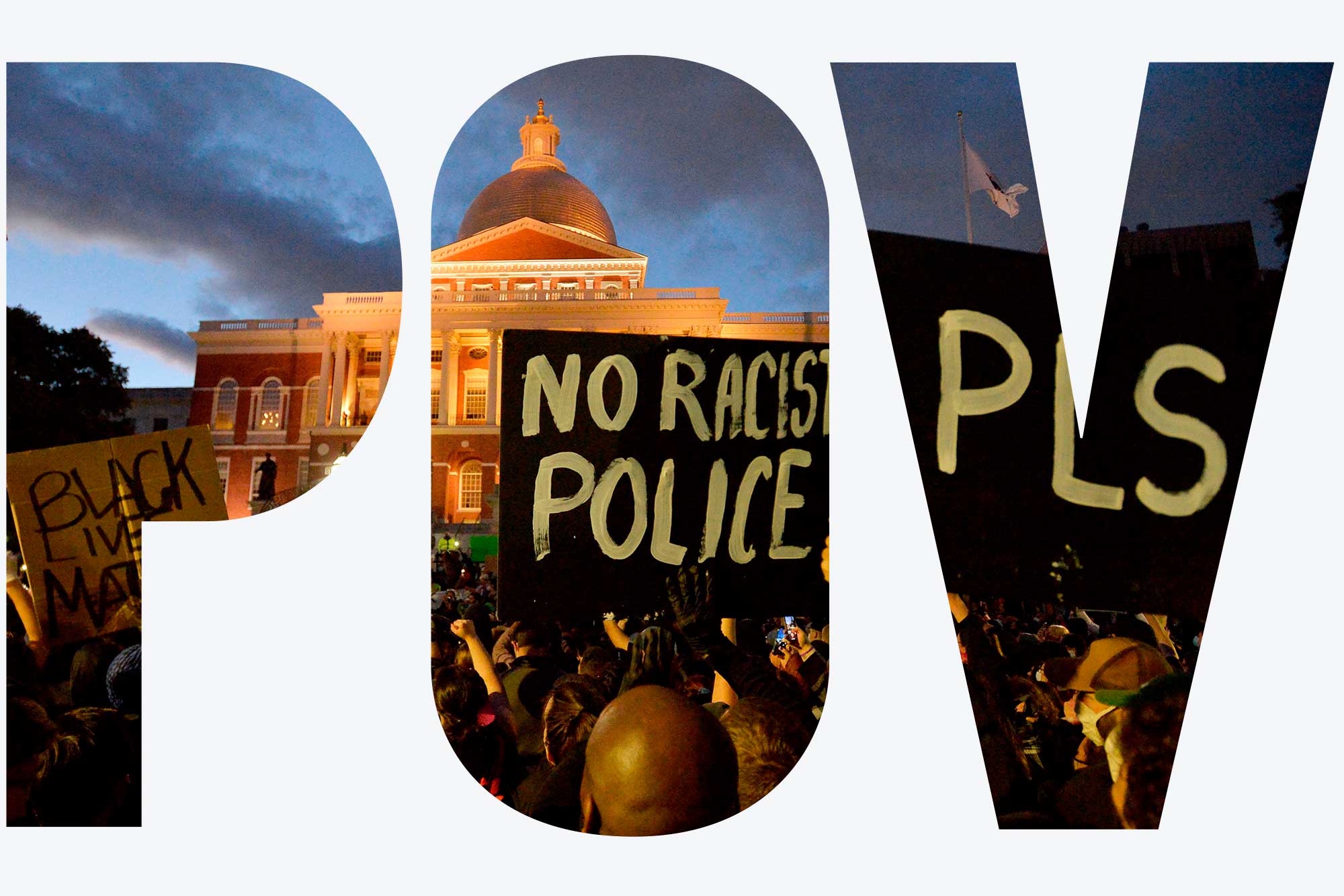POV: “I Am Angry. But I Will Not Waste My Anger”

Protesters gather outside the Massachusetts State House on May 31 during a demonstration about the death of George Floyd, an unarmed black man who died in police custody last week in Minneapolis. Photo by Joseph Prezioso/AFP via Getty Images
POV: “I Am Angry. But I Will Not Waste My Anger”
After a weekend of protests and violence, BU Dean of Students Kenneth Elmore speaks out, reluctantly hopeful, on trauma and tragedy
“No subject was forbidden, and the discussions ran the entire gamut of our interests and concerns, although they were inevitably related to our survival in a society that seemed to have no room for our young dreams and longings. Most often we came around to the central problems of self-realization as black men in American society. Invariably, we asked, why are we in college? What are we trying to find? How can we immunize ourselves against the destructive aspects of the environment? How do we manage the carking fear of the white man’s power and not be defeated by our own rage and hatred?”
—Howard Thurman (Hon.’67), from With Head and Heart
: The Autobiography of Howard Thurman
Beloved,
Another summer, another fire flares up. But it feels like there are no firefighters around.
My memory is sharpened by lessons from Emmett Till, the people’s unrest in Jersey, the rules for when we traveled Down South, Michael Griffith, Arthur Miller, MOVE, Edmund Perry, Yvonne Smallwood, Michael Stewart, Eleanor Bumpurs, Howard Beach, and Rodney King.
I still struggle with a reflex to explain that I exist, that I belong, and that I am going to live. I still put up with a whimsical, naïve, polite, and sometimes straight-out harassment and the need to stay on guard for violence. I remind myself that I am not going to let anyone rob me of my joy.
Beyond this place of wrath and tears
Looms but the Horror of the shade,
And yet the menace of the years
Finds and shall find me unafraid.
(from “Invictus,” by William Ernest Henley)
I am angry. But, I will not lose or waste my anger, and I suggest you don’t either. Let’s use it to do what our rights allow and what our conscience compels.
Peaceful marches and violent confrontations don’t seem to work. Despite the seminars, love, conversations, training, forgiveness, insistence on statements, calls to action, and credentials of wokeness, it feels like little has changed—in our interactions and with policing.
I am exhausted.
In all the planning for our economic revival and yet another new normal—this time healthier—are we forgetting to include a moral recovery in our plans? Perhaps we—higher education—can come together to redress government for a revival of civic institutions—the places where we gather, work, mobilize, and meet each other. Let’s get a large investment in no longer being oppressed by our habits, interaction and eye contact, random encounters, and culture shifts. Can we bail out community gathering spaces, artists, new libraries, health care, housing, places of culture, and education? Might moral pandemic relief deal with the persistence of racial and other disparities?
I am still reluctantly hopeful.
With a broken heart, my love goes out to families.
Much love to:
the families of Breonna Taylor and George Floyd
the families and individuals traumatized already and triggered by more tragic and senseless deaths
those of us perplexed by the ironic use of policing at this time
those of us worn by the uncertainty of what is next or what to do.
Comments & Discussion
Boston University moderates comments to facilitate an informed, substantive, civil conversation. Abusive, profane, self-promotional, misleading, incoherent or off-topic comments will be rejected. Moderators are staffed during regular business hours (EST) and can only accept comments written in English. Statistics or facts must include a citation or a link to the citation.